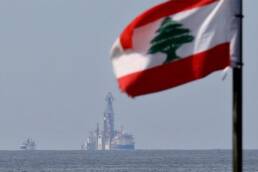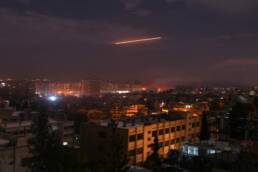The meeting of the Palestinian Central Council, which took place in early February 2022, contained one of the paradoxes, as it requested from the Palestinian Authority in Ramallah, the sponsor of the meeting, to stop the security coordination with Israel, which represents its raison d’etre, in addition to revoking recognition of Israel, which is a suicide option for the standing Palestinian Authority. This is not the first time that the Central Council claims such fiery recommendations, as its previous meetings were rich with texts that were not less revolutionary than its latest statement, without succeeding for years in having these recommendations adopted. However, this controversy poses the problematic of Palestinian National projects after nearly 20 years of the launching of the Oslo authority, in light of the huge divisions, the crisis of an impotent leadership that controls the Palestinian national movement, and the downgrading the mission of the Palestinian Authority into mere security coordination with Israel.
The Palestinian stalemate is most evident in the absence of any serious discussion of the future of the Palestinian national project, and in the monopoly imposed by Fatah movement and by Mahmoud Abbas over organizing the transition process of the President’s authority outside any electoral process whose results would not be guaranteed, to guarantee the ascendance of a personality that fits the requirements of Israeli security. For the issue of the succession to become the most important one for the Palestinians, the Israeli National Research Center, which is the Strategic mind closest to the decision-making circles in the occupying entity, has become one of the institutions that are calling for organizing a transitory process to find a successor to Abbas, as this position is the cornerstone in security coordination, and one of the pillars of the Israeli National Security. One of the paradoxes is that none of parties of the Palestinian official side ever talked about the process of electing a member of the Oslo team in Ramallah. Historically speaking, the meetings of the central committee of Fatah were limited to electing President Abbas, and to choosing Hussein El-Sheikh to succeed the late Saeb Ureikat in the executive committee of the Palestinian Liberation Organization (PLO). As for the experts of the Palestinian cause in the Israeli media and research centers, they took charge of presenting a more realistic vision to the rise of El-Sheikh, rendering the event as the moment of the launching of the process of succession to Abbas, and to promote Hussein El-Sheikh as the candidate to become the third president of the Palestinian Authority.
What are the qualifications of the successor of Abbas
For the first time, it is necessary to talk about the succession of President Mahmoud Abbas more clearly than in the past, between evasive doors, by placing the man closest to Israel on the platform of the succession of the president. At a time when Mahmoud Abbas approaches the exhaustion of his eighty-seventh year, his constitutional and popular legitimacy is being eroded with two successive postponements of the elections, and the authority has been transformed from a political representative institution to a mere security framework that works to stabilize the occupation and the results of Oslo, facilitate the Israeli settlement expansion in Area C, and link its major bloc in The heart of the West Bank, which now includes 600,000 settlers, and the separation of the northern West Bank from its south, which is what the PA project led to after the death of President Yasser Arafat, knowing that the job of any president who will succeed Abbas through Israeli tanks will be security coordination with Israel.
The Central Council meeting descended as a shovel strike that paved the way for the Israeli option by placing Hussein al-Sheikh on the succession platform, and by appointing one of the security coordination engineers (since 2007) as the Secretary of the Executive Committee. Sacrificing national unity and trampling on calls for postponement due to the lack of a balanced representative quorum, did not constitute a great concern for those responsible for this scenario in Ramallah and Tel Aviv. The issue is not limited to the symbolism of the transfer of the decision in Ramallah from the hands of the diaspora generation to the hand of a generation that grew up and rose up at home, before being immersed in and around security coordination. As this event goes beyond the symbolic meanings of the end of one generation and the rise of another generation, the Palestinian national movement has entered into an additional crisis since in Oslo, it exchanged its weapons in return for counting on the two-state solution, which is no longer on the Israeli agenda, while the Palestinian leadership did not elaborate any alternative project, contenting itself with an imaginary bet on a change in the American stance.
And in the context of the transitional process that is being organized, if President Abbas continues to supervise it, a new stage will be set for the Oslo project, in which the authority in Ramallah will be formally integrated into the Israeli security system, by choosing one of the symbols of this authority, Hussein el-Sheikh, whose weight has so far prevailed. This scenario also provides for a smooth transfer of power between the wings of Oslo and security coordination, without risking the process spinning out of control if the matter is left to the voters alone.
President Abbas canceled the presidential elections in April of last year, under the pretext that the occupation prevented the opening of four electoral boxes to Jerusalemites as stipulated in the Oslo Accord. However, the real goal was Abu Mazen’s desire to avoid an expected defeat in front of the most famous Palestinian prisoner, the leader of the Al-Aqsa Martyrs’ Brigades Marwan Barghouti, who came first in the polls. Hence, it is evident that Abbas’ main goal is to neutralize Barghouti. That was why Abbas and Israel chose this time a twisted way to cut off all roads leading Barghouti to Ramallah, and to keep him in prison as he has become a common enemy for both Mahmoud Abbas and Israel.
When and how the transitory process has started?
Mahmoud Abbas’ promotion of the head of the Committee of Coordination of Civil Affairs Hussein El-Sheikh to the executive committee was not detached from a long process to strengthen one of the two pillars of the Israeli security structure within the Palestinian Authority next to Brigadier General Majed Faraj. It was also an integral part of its security structure whose mission is to contain the resistance and assist the Israeli security agencies in chasing the opponents to Oslo and in enforcing he occupation authority on the Palestinian Occupied territories. Israel favoring of El-Sheikh over Faraj is due to the former’s bigger organizational legitimacy, in addition to his control of wider civil services networks that play the role of mediator between 200,000 Palestinian families and Israel. In addition, he supervises tax collection from Israel, which has become the sole pillar of the Palestinian Authority and the source of 90 percent of its revenues, which are used by Israel to manipulate the institutions of the PA.
Within the framework of this scenario, the transitional process was first organized through time-spaced steps, but it seemed to be organically interconnected to seize all its stages: 1 starting with postponing the elections, both legislative and presidential, to eliminating any alliances that obstruct the transitional process as outlined by the security coordination, and gaining time for the maturation of a candidate from within the Israeli axis in the Palestinian Authority; 2 Renewing the term of Mahmoud Abbas; 3 the establishment of an understanding between Mohammed Dahlan with all the Arab Gulf networks that he has and Marwan Barghouti with his revolutionary legitimacy; 4 Making drastic changes in the structure of Fatah by amending its internal charters to reinforce the control of the Oslo team and isolate the opposition; 5 neutralize the potential competitors one by one and play on contradictions among each other; 6 weaken what remains of the Barghouti movement and his revolutionary legitimacy.
Would Israel and the Palestinian Authority be early in opening the battle of succession?
Abbas’ presence in the succession arrangements represents a great guarantee for its success, because his sudden absence before completing it and seizing all its joints may lead to turning the table on its perpetrators, and to obstruct the promotion of Hussein El-Sheikh. There are many scenarios in this regard. Because the sudden disappearing of Mahmoud Abbas from the scene will blow up all arrangements and appointments made by the central committee of Fatah, which could all be revoked in case of the disappearing of Abbas. Will the Israeli pressure succeed in speeding up the process of succession to preempt the probable disappearance of Abbas and the possibility of the rise of a big opposition to its own candidate whose nomination to the central committee will not be enough to promoting him to president of the PA? Does the early imposition of a successor from within the security coordination as president of the PA aim to win time to convince the opponents to support him, or to cause discord that would later facilitate confronting those who are against his appointment?
Completing this process depends on Abbas staying in Ramallah, no matter how long this period, and his resignation at a later time to facilitate the succession, knowing that it is the weakest possibility, because those who know Abbas exclude the occurrence of such a scenario. It will not be easy for Hussein al-Sheikh to reach Ramallah on top of the security coordination tanks. If this happened, then as soon as Abbas leaves his role as arbitrator between the various Fatah factions and its centers of power, then the likely scenario would be for the West Bank plunge into chaos and great violence in the Palestinian street with the ignition of resistance in the face of the Israeli occupation. It will not be enough to revert to using money and security forces to contain the opposition, for it will always be possible for the opponents to revert to arms which they have in abundance, starting with Mohammed Dahlan who enjoys great military presence in the camps of the West Bank, to Gibril Rajjoub who relies on a strong Fatah and popular base in southern Khalil and Ramallah. As for Hamas and Islamic Jihad, they might benefit from the opportunity provided by the weakening of the security coordination grip and the division of its symbols and tools to launch operations against the occupation, and to prevent the rise of a prominent figure in the West Bank that would be hostile to Gaza, especially after the success of the operation of Seif Al-Quds in setting the link between the West Bank and Gaza.
The Arab position and the project of the Palestinian Authority After Abbas
Israel’s monopoly of the option to promote a Palestinian leadership loyal to it will bring about an unprecedented strategic shift that will not be accepted by countries like Egypt, which has played a historical role in promoting any Palestinian leadership since Mufti Amin al-Husseini headed the Higher Committee for Salvation in the 1930s. It would not be enough that the Russian emissary to the Middle East Mikhail Bogdanov congratulates Hussein El-Sheikh in the central committee of the PLO, nor would it be enough that Israeli Foreign Minister YAIR Lapid receives El-Sheikh right after his appointment, to render him a natural candidate, while marginalizing his Arab legitimacy which is still essential, despite marginalizing Syria and Jordan, in completing the transition process of the PA. Because it is impossible for any Palestinian personality to become president of the PA without an Arab depth, that is without the approval of Egypt, Syria, Jordan, KSA, and Algeria.
Based on the aforementioned, it is evident that the current Palestinian political leadership does not sense the risks of its options regarding a successor to Abbas, which is deepening the Palestinian division and the security coordination with Israel. The single-handedly decision-making approach from the part of the president of the PA, who also heads the PLO, as was evident in the meeting of the central committee of the PLO, will deepen the feeling of alienation among a wide spectrum of the Palestinian national and popular movement, including factions within Fatah. In spite of this the option is still available for everybody to stop the current operation in case the damaged powers get united first inside Fatah and second among all Palestinian factions, to confront giving priority for security coordination with Israel at the expense of the Palestinian national project.
#caus #centre_for_arab_unity_studies #Palestinian_authority_after_Abbas #mahmoud_abbas #Palestinian_authority #Palestinian_Cause
مركز دراسات الوحدة العربية
فكرة تأسيس مركز للدراسات من جانب نخبة واسعة من المثقفين العرب في سبعينيات القرن الماضي كمشروع فكري وبحثي متخصص في قضايا الوحدة العربية
We appreciate your support
SUPPORT THE CENTRE FOR ARAB UNITY STUDIES
The Centre is reaching out for its friends and readers for support, whether by ordering our publications and paying for them in hard currency, or through donations. The Centre welcomes any support to boost its resiliency, to ensure its survival, the continuation of its legacy and its commitment to tackle issues facing the Arabs and the Arab world.



